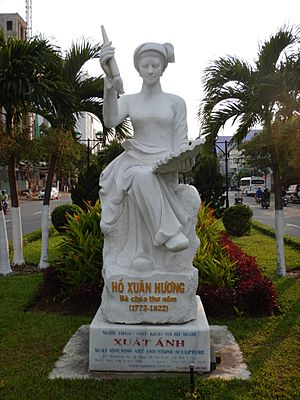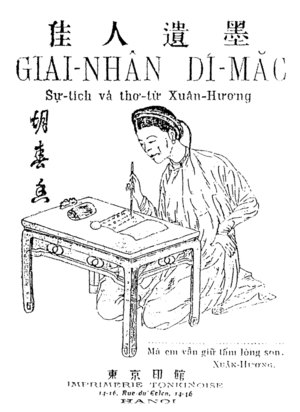Hồ Xuân Hương facts for kids
Hồ Xuân Hương (born around 1772, died around 1822) was a famous Vietnamese poet. She lived during a time of big changes and wars in Vietnam, when the old Lê dynasty was ending and new leaders were fighting for power.
Hồ Xuân Hương wrote her poems using chữ Nôm, which was a special way of writing Vietnamese using adapted Chinese characters. She is known as one of Vietnam's greatest classical poets. A modern poet named Xuân Diệu even called her "The Queen of Nôm poetry" because of her amazing work.
Contents
Biography
It's a bit tricky to know all the exact details about Hồ Xuân Hương's life. But we do know she was born in Nghệ An Province in Vietnam. She later moved to Hanoi when she was still a child. Many people believe she was the youngest daughter of a scholar named Hồ Phi Diễn.
Hồ Phi Diễn was a smart man who earned a special diploma at a young age. Because his family wasn't rich, he worked as a teacher. He met a woman from Bắc Ninh, and Hồ Xuân Hương was born from their relationship.
Hồ Xuân Hương became well-known for her clever and funny poems. She is thought to have married twice. Her poems mention two different husbands. She was a second wife to one of them, a high-ranking official. She wasn't very happy in this role. Her second marriage didn't last long because her husband passed away just six months after they married.
She spent the rest of her life in a small house near West Lake in Hanoi. She often had visitors, including other poets. She earned a living by teaching. She also seemed to travel a lot, as she wrote poems about different places in Northern Vietnam.
Living as an independent woman in a society that followed Confucianism (a system of beliefs about how people should live), Hồ Xuân Hương showed a very strong and independent mind. Her poems often shared her thoughts on society and used a lot of humor.
Legacy

By writing most of her poems in `chữ Nôm`, Hồ Xuân Hương helped make the Vietnamese language more important for literature. This was a big step for Vietnamese culture.
Today, `chữ Nôm` is not used much. Most Vietnamese people now use Quốc Ngữ, which is a writing system based on the Latin alphabet. This system was introduced when the French were in Vietnam.
Some of Hồ Xuân Hương's poems have been collected and translated into English. One famous collection is Spring Essence by John Balaban.
Another important Vietnamese poet from her time was Nguyễn Du. He also wrote in Vietnamese, helping to create a national literature for Vietnam.
You can find streets named after Hồ Xuân Hương in several cities across Vietnam.
Works
Hồ Xuân Hương's poems are famous for their cleverness and sometimes hidden meanings. She often used everyday things to talk about bigger ideas.
The Jackfruit (Quả Mít, 果櫗)
| Vietnamese Chữ Nôm (chữ Nôm, 𡨸喃) | Vietnamese alphabet (chữ Quốc Ngữ, 𡨸國 ngữ) | English Translation |
|---|---|---|
| 身㛪如果櫗𨕭𣘃 | Thân em như quả mít trên cây, | My body is like a jackfruit on a tree, |
| 𤿭伮摳縐梅伮𪠗 | Vỏ nó sù sì, múi nó dày. | Its skin is rough, its pulp is thick. |
| 君子𣎏𢞅時㨂梮 | Quân tử có yêu thì đóng cọc, | Dear gentleman, if you like it, then use a stick, |
| 吀𠏦𢺳𢱖𣺾𦋦𢬣 | Xin đừng mân mó nhựa ra tay. | Please don't touch it too much, or the sap will stain your hands. |
The Cake That Drifts In Water (Bánh Trôi Nước, 𩛄𬈼渃)
| Vietnamese Chữ Nôm (chữ Nôm, 𡨸喃) | Vietnamese alphabet (chữ Quốc Ngữ, 𡨸國 ngữ) | English Translation |
|---|---|---|
| 身㛪𣃤𤽸𫣚𣃤𫣝, | Thân em vừa trắng lại vừa tròn, | I was born pure and beautiful, |
| 𠀧沉𦉱𬈗貝渃𡽫。 | Ba chìm bảy nổi với nước non. | Yet my life's full of struggles. |
| 𠡧𬄅默油𢬣仉𡔃, | Rắn nát mặc dầu tay kẻ nặn, | My fate is in the hands of those who shape me, |
| 𦓡㛪𫪏𡨺𬌓𢚸𣘈。 | Mà em vẫn giữ tấm lòng son. | But I will always keep my true, loyal heart. |
- "Thân em vừa trắng lại vừa tròn," means "my body is white and round," like the cake in the water.
- "Ba chìm bảy nổi với nước non." means "sunk down three times, floated up seven times." This phrase talks about the many ups and downs someone faces in life.
- "Rắn nát mặc dầu tay kẻ nặn," means "hard and crumbled through the hands of the molder." This refers to how someone's life can be shaped by others.
The Unfortunate Plight of Women (Thân phận người đàn bà, 身份𠊛彈婆)
| Vietnamese Chữ Nôm (chữ Nôm, 𡨸喃) | Vietnamese alphabet (chữ Quốc Ngữ, 𡨸國 ngữ) | English Translation |
|---|---|---|
| 𪠠姉㛪𠲖𣎏𪿍空, | Hỡi chị em ơi có biết không, | Hey sisters, do you know, |
| 𠬠邊𡥵哭𠬠邊𫯰。 | Một bên con khóc một bên chồng. | On one side, the child cries, on the other side, the husband. |
| 𢂞俱監巖𭺗𨕭䏾, | Bố cu lổm ngồm bò trên bụng, | The busy father is moving around, |
| 僶𡮣吁嘘哭𠁑胸。 | Thằng bé hu hơ khóc dưới hông. | The baby is crying nearby. |
| 畢哿仍羅收貝𢯝, | Tất cả những là thu với vén, | All of these are about gathering and tidying, |
| 𪬽傍閙仍𩸮拱𣜳。 | Vội vàng nào những bống cùng bông. | Hurrying with all the daily tasks. |
| 𫯰𡥵𫡔嫧羅如勢, | Chồng con cái nợ là như thế, | Such is the busy life with husband and children, |
| 𪠠姉㛪𠲖𣎏𪿍空。 | Hỡi chị em ơi có biết không. | Hey sisters, do you know? |
See also
 In Spanish: Hồ Xuân Hương para niños
In Spanish: Hồ Xuân Hương para niños
 | Kyle Baker |
 | Joseph Yoakum |
 | Laura Wheeler Waring |
 | Henry Ossawa Tanner |





